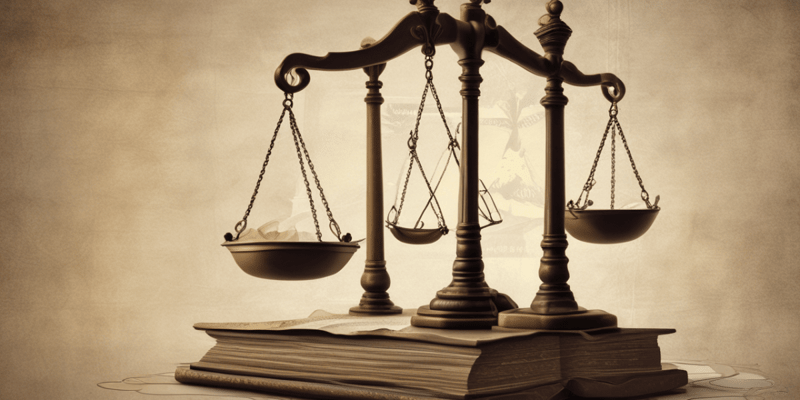Podcast
Questions and Answers
What is a key tenet of legal positivism regarding the relationship between law and morality?
What is a key tenet of legal positivism regarding the relationship between law and morality?
Which philosopher argued that unjust laws must still be enforced by courts regardless of moral considerations?
Which philosopher argued that unjust laws must still be enforced by courts regardless of moral considerations?
According to Fuller, under what conditions can a system be denied the title of law?
According to Fuller, under what conditions can a system be denied the title of law?
How does natural law theory fundamentally differ from legal positivism?
How does natural law theory fundamentally differ from legal positivism?
Signup and view all the answers
In the context of Hart's rule theory, what is the significance of legal rules in a society?
In the context of Hart's rule theory, what is the significance of legal rules in a society?
Signup and view all the answers
What is a central tenet of legal positivism?
What is a central tenet of legal positivism?
Signup and view all the answers
According to the content, which influence affects the detail of law and legal systems in the region?
According to the content, which influence affects the detail of law and legal systems in the region?
Signup and view all the answers
Which of the following best describes Austin's command theory?
Which of the following best describes Austin's command theory?
Signup and view all the answers
What does the change to Grenada's Constitution exemplify?
What does the change to Grenada's Constitution exemplify?
Signup and view all the answers
Natural law theory is primarily concerned with which aspect of law?
Natural law theory is primarily concerned with which aspect of law?
Signup and view all the answers
Hart's rule of recognition is primarily concerned with distinguishing what?
Hart's rule of recognition is primarily concerned with distinguishing what?
Signup and view all the answers
Which of the following statements is most likely a misconception about law according to the content?
Which of the following statements is most likely a misconception about law according to the content?
Signup and view all the answers
In which way have Caribbean legal systems deviated from traditional Westminster-style democracy?
In which way have Caribbean legal systems deviated from traditional Westminster-style democracy?
Signup and view all the answers
How does Austin's Command Theory define law?
How does Austin's Command Theory define law?
Signup and view all the answers
What distinguishes primary rules from secondary rules in Hart's legal theory?
What distinguishes primary rules from secondary rules in Hart's legal theory?
Signup and view all the answers
According to natural law theorists like Thomas Aquinas, what is a key aspect of law?
According to natural law theorists like Thomas Aquinas, what is a key aspect of law?
Signup and view all the answers
What is a fundamental belief of legal positivism?
What is a fundamental belief of legal positivism?
Signup and view all the answers
What does Austin mean by sovereign in his Command Theory?
What does Austin mean by sovereign in his Command Theory?
Signup and view all the answers
How do natural law theorists view the nature of law in relation to human conduct?
How do natural law theorists view the nature of law in relation to human conduct?
Signup and view all the answers
What role do secondary rules play in Hart's theory of law?
What role do secondary rules play in Hart's theory of law?
Signup and view all the answers
What is a criticism often directed at Austin's Command Theory?
What is a criticism often directed at Austin's Command Theory?
Signup and view all the answers
Study Notes
### Origins of Legal Positivism
- Austin (1790-1859) developed the "command theory" of law, stating that laws are commands issued by a sovereign backed by sanctions.
- The sovereign is defined as a superior entity habitually obeyed by inferiors but who does not obey anyone else.
- This theory emphasizes the power dynamics and social structures that underlie legal systems.
Legal Positivism's Core Principle
- Positivism separates the existence of law from its moral worthiness.
- Law is determined by what has been established through rules, decisions, or practices, regardless of its ethical implications.
Hart's Contribution
- Hart (1907-1992) expanded on positivism by proposing a "system of rules" model.
- Primary rules govern actions and behavior.
- Secondary rules dictate how primary rules are created, amended, or interpreted – serving as a framework for legal regulation.
Natural Law Theory
- Natural law theory posits that law is rooted in inherent moral principles, discoverable through reason.
- These principles are considered objective and universal, reflecting the natural order of the universe.
- Thomas Aquinas (1225-1272) defined law as an ordinance of reason for the common good, established by proper authority and made public.
Distinction Between Natural Law and Legal Positivism
- Natural law: Asserts that morality is central to law, influencing the content, evaluation, and analysis of legal rules.
- Legal positivism: Maintains a strict separation between law and morality.
Debating the Nature of Unjust Laws
- Hart: Courts are obligated to apply properly enacted laws, regardless of their perceived morality. Individuals may oppose such laws on moral grounds but must accept the legal consequences.
- Fuller (1902-1978): Argued that a system lacking in fundamental principles of legality, including arbitrary enforcement and retroactive legislation, cannot be considered
The Evolution and Adaptability of Law
- Law should reflect and guide society.
- While Western legal systems are the basis for many Caribbean nations, their application and details have been adapted to their unique social, political, and economic contexts.
- Grenada, for example, underwent a period of constitutional suspension and fundamental changes to its court structure, raising complex questions about state legitimacy.
- The Caribbean legal landscape continues to evolve, reflecting a "striving" to be West Indian, with varying degrees of adaptation to local needs.
The Importance of Theoretical Lenses
- Understanding legal systems requires considering different theoretical perspectives.
- The definition of law is influenced by the theoretical school of the individual providing the definition.
Studying That Suits You
Use AI to generate personalized quizzes and flashcards to suit your learning preferences.
Related Documents
Description
Explore the foundational concepts of legal positivism, focusing on the contributions of Austin and Hart to legal theory. Understand the distinctions between law's existence and its ethical implications, as well as the structure of legal rules. This quiz covers key principles and historical developments in legal positivism.




